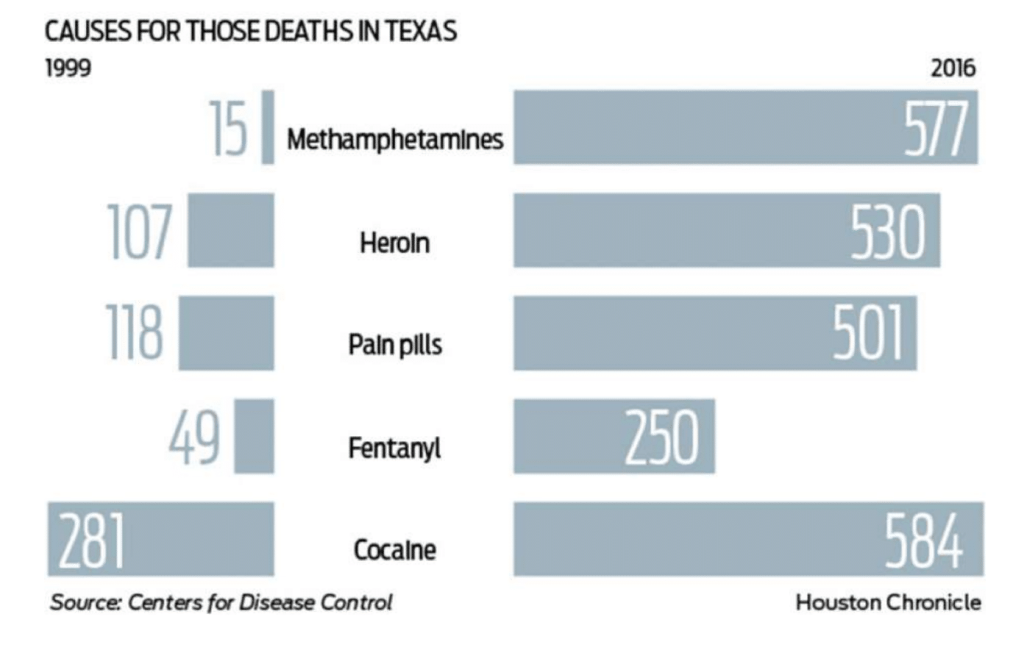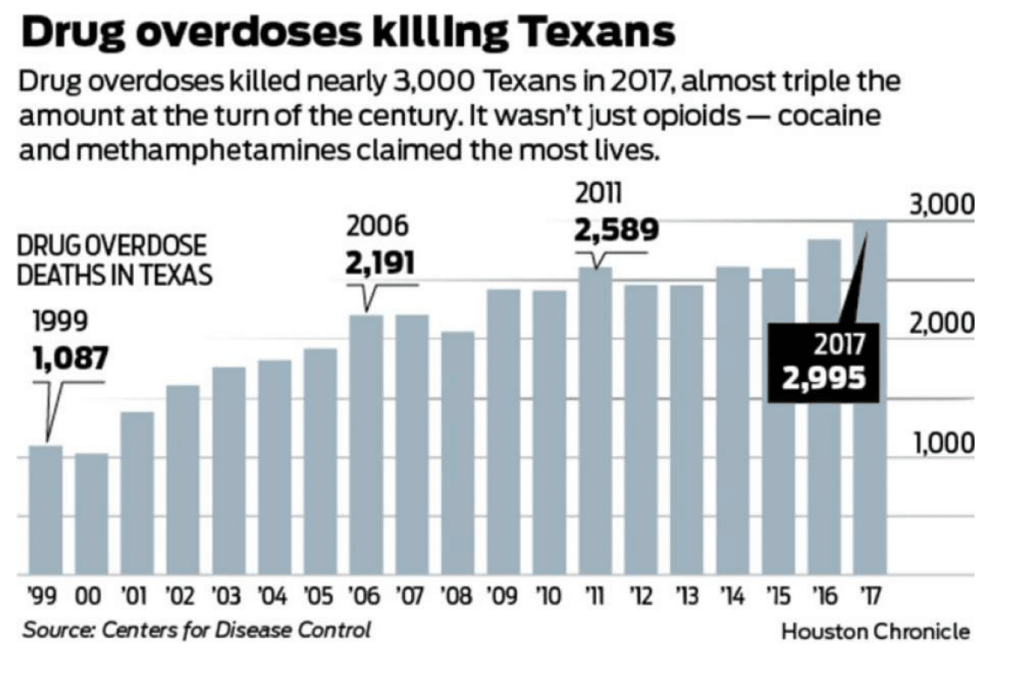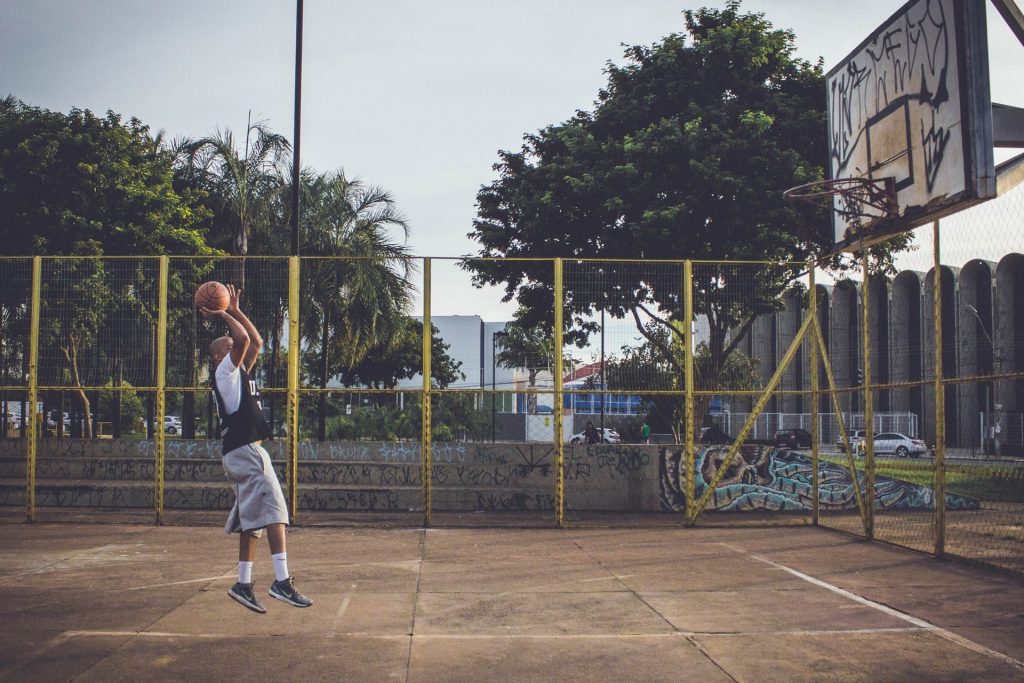Why is Meth so Hard to Quit?
Methamphetamine, speed, ice, or crystal meth is hard to quit simply because it is one of the most addictive drugs known to exist. In the 1990’s and early 2000’s methamphetamine was a major problem in Texas and across the whole nation because the ingredients were relatively easy to obtain at your local, street corner drug stores. The availability of ephedrine and other cold medications used to manufacture meth was at a high point. Then, between 2005-2006, the United States Federal Government began regulating the cold medicines used to manufacture meth. This created a decrease in meth production, coupled with a decrease in social indicators of misuse and abuse for the drug.
This decline in drug abuse indicators for meth continued until fairly recently. Methamphetamine has made quite the comeback, especially in southern and western states, partially due to the influence of the Mexican drug cartels. This new methamphetamine epidemic has been overshadowed by the constant media headlines of the opioid epidemic. While many politicians, governing agencies and the news media are focused on heroin and prescription pain killer overdose deaths, meth is silently killing thousands of Americans every year. Sadly, it appears only to be getting worse.
Methamphetamine is incredibly addictive, which makes meth hard to quit.
With the US crackdown on meth labs in the early 2000’s, we have a new precursor to methamphetamine manufacture known as phenyl-2-propanoe (P2P). This is what the Mexican drug cartels use in meth production that makes their versions so much more potent. The increase in meth potency from south of the border also makes the substance much, much more addictive. The intoxicating effects of Mexican meth is far greater that what we saw just a decade ago coming from American meth labs. The potency alone contributes to substance abuse and addiction at a far higher rate than we’ve seen in the past.
In Houston, Texas, the presence of methamphetamine is at an all time high, according to the Drug Enforcement Agency (DEA). Meth lab seizures in Texas are virtually non-existent, however as the majority of the drug seizures in the United States can be traced back to Mexico. Meth from Mexico is typically transported to the US in liquid form. The liquid methamphetamine is smuggled into the US in modified gas tanks. This liquid meth is then converted into its typical crystal form at conversion labs here in the US. This is commonly a much more potent form of the drug than we’ve seen in the past. Lab testing in 2007 showed an average meth purity level of 39 percent. Today, meth found on the streets in the US typically tests around a level of 93 percent purity.

The greater availability and increased potency of meth, means more abuse and more drug overdoses.
Stimulant overdoses from cocaine and meth are the leading cause of drug overdose deaths in the state of Texas. Fentanyl overdose deaths are also spiking currently and many attribute this to the increase in stimulant overdoses. This is somewhat ironic, as fentanyl is a synthetic opioid, which is quite the opposite of a stimulant. However, drug dealers in Texas will order the drug from China and mix it in with their supply of cocaine, methamphetamine or counterfeit prescription pills. No one is completely certain as to why drug dealers mix fentanyl with drugs that are supposed to have the exact opposite effect, but it may be to increase the perceived potency of their drugs, or it might even be entirely accidental. Some drug labs or pill mills (which Houston is notoriously known for), may manufacture or cut different drugs with the same lab equipment, which can lead to unintentional cross-contamination of drugs. Fentanyl is so deadly that just a dose the size of 3 grains of salt is enough to kill an average human being.

Many who abuse methamphetamine are also known to use other substances as well. The Chicago Tribune recently ran a story about dual addiction, titled: “Meth in the morning, heroin at night”. Across the nation, meth use is on the rise and many experts are saying the opioid epidemic has given crystal meth a resurgence. Opioid users who admit to using meth as well has gone up from 19% in 2011 to 34% in 2018. This evidence suggests that as doctors began to cut back on writing prescriptions for opioids, that many users began to seek street drugs like meth and heroin.
For others, methamphetamine and opioids can offer a type of synergistic high. The two types of drugs in combination can sort of balance each other out, making it seem that the user is able to function normally. In the past, the term “speedball” (which was a mix of heroin and cocaine) was used to describe the balancing of two, seemingly opposite drugs. This combination has been deadly, killing many people, including notable celebrities such as: John Belushi, Chris Farley, Ken Caminiti, Mitch Hedberg, Chris Kelly and Phillip Seymour Hoffman.
In theory, the meth combats the opioid’s drowsiness, while the opioid balances out the erratic, spastic “tweakiness” of the methamphetamine. Many people who abuse any type of drug end up “chasing the dragon” trying to feel “normal” again. For some people, their “normal” is constantly changing. This happens as their body’s tolerance to the drugs they’re using fluctuates, or the potency or types of drugs they are currently using can change rapidly as well. This is a dangerous balancing act, one that has led many people to dangerous and deadly consequences.

Meth is a drug that is very hard to quit. The crisis at the US-Mexico border has helped create a meth-overdose epidemic.
While the opioid crisis appears to be slowing-down, a new meth-fueled crisis is poised to take its place. It is estimated that 774,000 Americans used methamphetamine in 2017. When US lawmakers cracked-down on the manufacture of meth in the mid-2000’s, it worked. That is, until the Mexican drug cartels filled-in the gap. Now meth is available in virtually every community across the United States. While it is extremely important to keep focusing efforts on combating the opioid epidemic, we should be looking at ways to help people who need treatment for an addiction. This act alone would cut down on the demand for these dangerous drugs, which is the first step towards truly combating the problem.
If you or someone you know needs help with a substance abuse problem, please don’t hesitate to call us at More Than Rehab. We are available 24/7 to help or your loved one create the foundation to live a better life. We offer the best in evidence-based addiction treatment in the greater Houston area. Please don’t wait any longer, call us right away:











